The importance of social networks in the Puerto Rican protests
How a country united under the same hashtag, #RickyRenuncia.

Showing with data, how important the hashtag #RickyRenuncia, was.
July 2019, was a historical month for Puerto Rico. On the 13th, the Puerto Rico’s Center for Investigative Journalism leaked a document consisting of 889 pages of Telegram messages interchanged between the then-governor, Ricardo Roselló, and inner members of his staff. It’s content included messages of misogynistic content, homophobia, sexism, vulgar language, and even jokes towards the victims of Hurricane María.
Obviously, the people of Puerto Rico didn’t agree nor accepted these before-mentioned messages. And in the wake of such controversy, they took over the streets of Old San Juan to protest. The outcome was the resignation of the governor, as well as several members of his cabinet. But, what indeed marked these manifestations — besides the fact they worked and managed its objective — and made them truly unique, efficient, and if I may say, millennial, was the influential role that the social networks played.
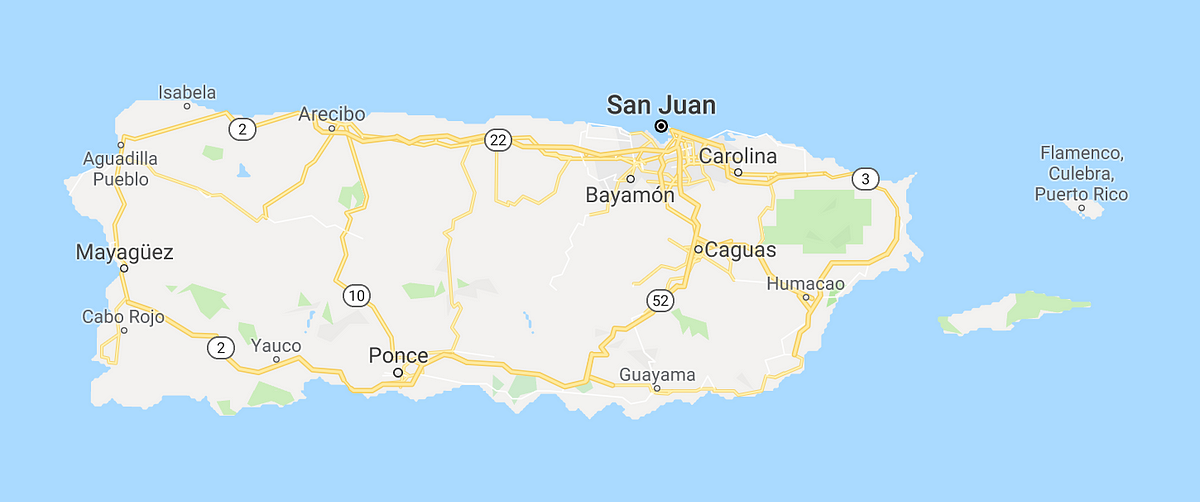 Puerto Rico
Puerto Rico
Puerto Rico is a small island, with only 3.2 million habitants. Of those, around 350,000 (a bit more than 10%), live in San Juan, the capital and center of the government. The point I want to illustrate is that under these circumstances, rallying up a crowd, big enough to storm the streets of San Juan is not necessarily an impossible task — or at least, in terms of transportation and mobility. Notwithstanding, even though the country is physically close together, it decided to unite under one collective movement, #RickyRenuncia, Spanish for “Ricky [nickname of the former governor] resign.”The hashtag was an undeniable success, after all, the governor resigned, and its mission was carried out. And now that its usage has declined, I wanted to investigate certain things about it.In this article, I’ll be exploring and investigate data regarding the usage of this now historic hashtag. Through several visualizations, I’ll show how popular, trendy, and evolving, it was.Following its inception, #RickyRenuncia, rapidly became a Twitter trending topic, not even in Puerto Rico, but also in the United States. Let’s see the numbers.
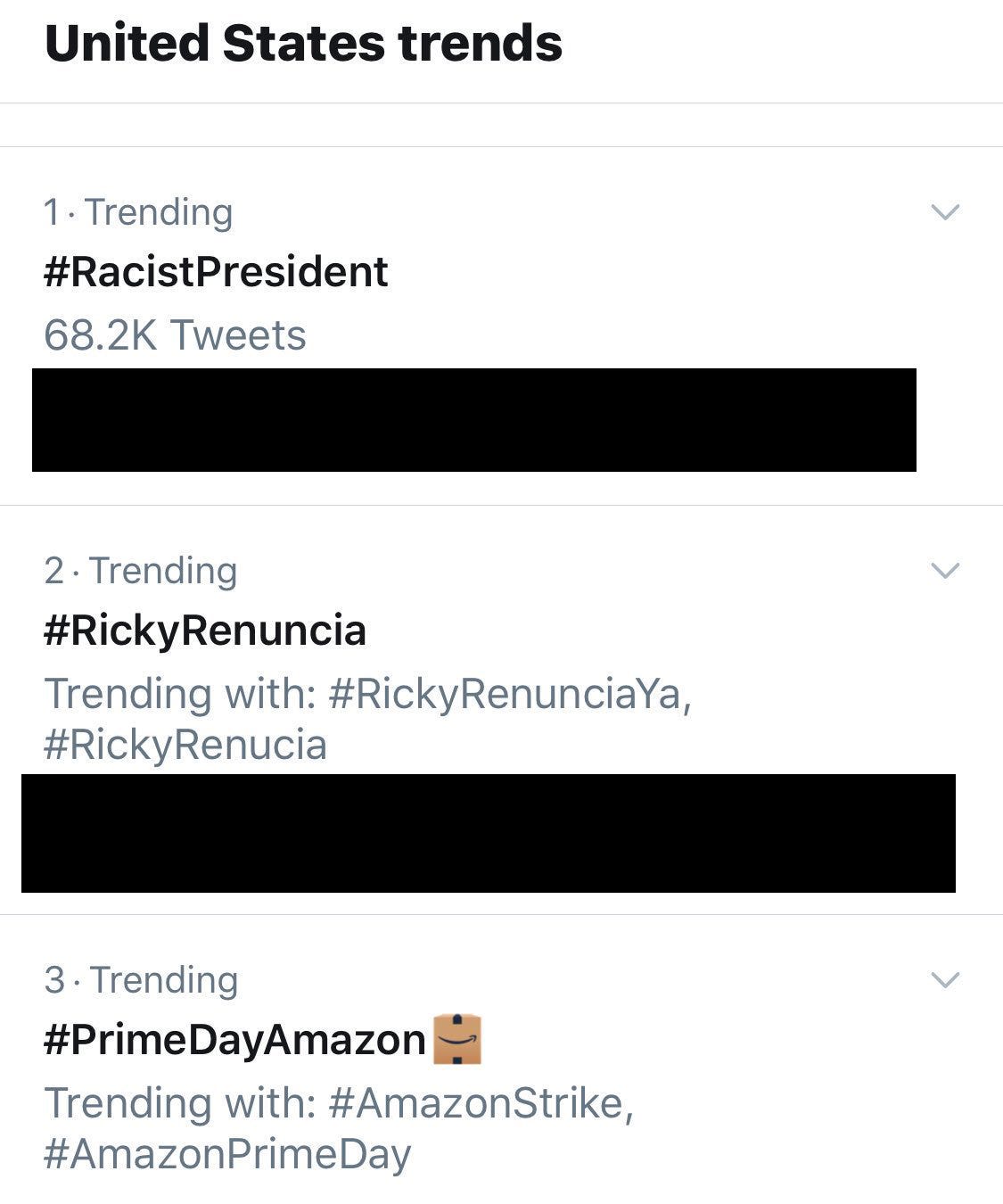 Twitter Trending Topics from July 16.
Twitter Trending Topics from July 16.
This screenshot shows the trending topics from the United States at some point on July 16. And it shows #RickyRenuncia in the second position, beating #PrimeDayAmazon, which refers to Amazon’s well-known and highly anticipated yearly sales event.
The hashtag didn’t stop on Twitter; on Instagram, it was also a hit. At the time of writing, there are 242,989 posts with the hashtag, in which a vast majority of them feature this image:
 An iconic image.
An iconic image.
Furthermore, some people added their own flavor to the hashtag, resulting in some trendy ones that while didn’t become as big as #RickyRenuncia, are worth a mention. The following image show some of them, and the number of times they appear on Instagram.
 Instagram hashtags related to #RickyRenuncia. Source: https://keywordtool.io.
Instagram hashtags related to #RickyRenuncia. Source: https://keywordtool.io.
The first and third hashtag from this image, #rickyrenunciaya, and #rickyrenunciaahora means “ricky resign now,” while in the last one, the word “puñeta,” is a very Puerto Rican interjection that in this means “damn.”
The trend was so strong that it surpassed the realm of social networks. As we’ll see in the next images from Google Trends, many people, not only in Puerto Rico, were also searching for the now-famous phrase.
 The popularity of "#RickyRenuncia." Source: Google Trends.
The popularity of "#RickyRenuncia." Source: Google Trends.
This image represents the worldwide popularity of the Google search query “#rickyrenuncia,” and in it, we can see how sudden was its development. Even more impressive, is the fact that even after the resignation, the search is still active.
The next visualization, also from Google Trends, are the countries where the search query was most popular.
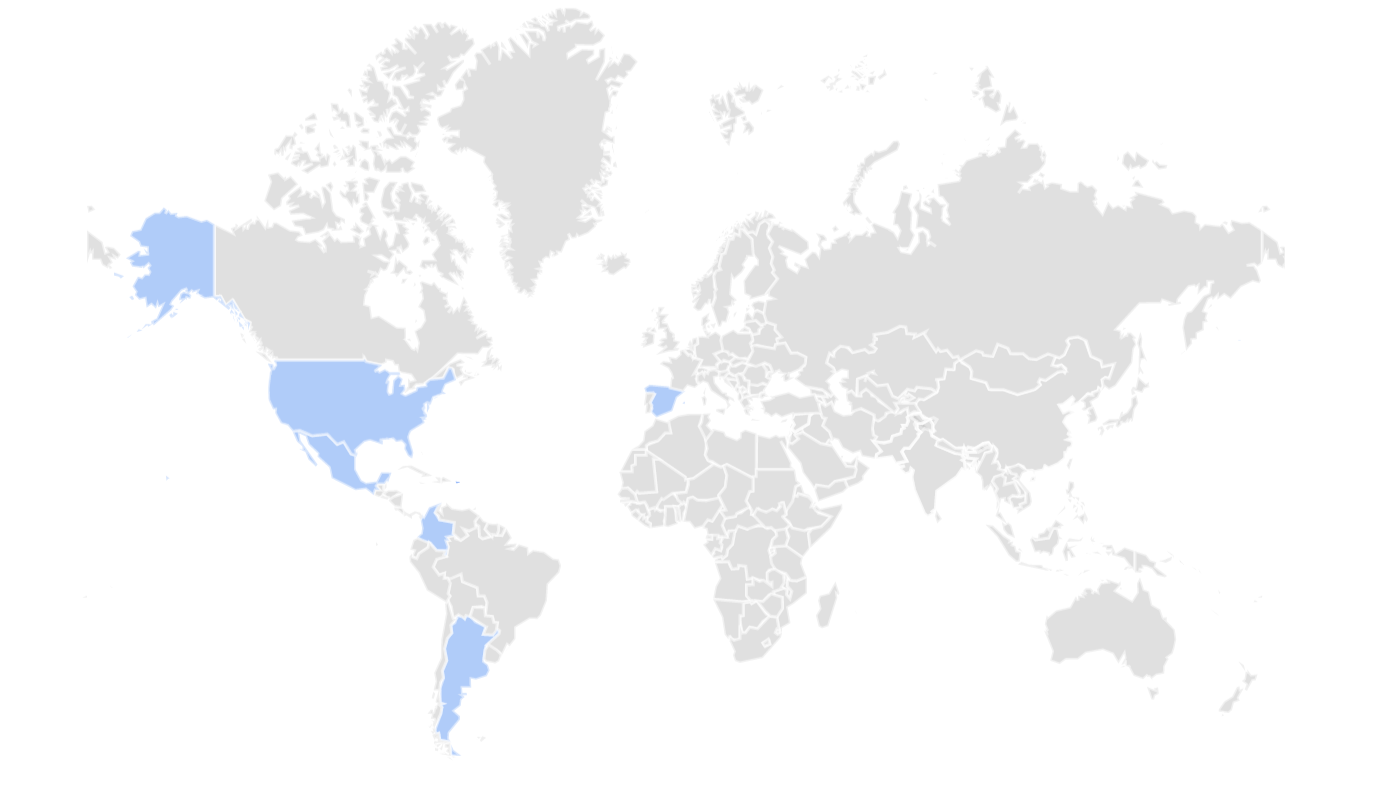 The popularity of "#RickyRenuncia." Source: Google Trends.
The popularity of "#RickyRenuncia." Source: Google Trends.
Notice that besides Puerto Rico, and the USA, most of the searches came from Spanish-speaking countries.
On July 25, after two weeks of protests, the governor resigned, and with that, the #RickyRenuncia movement grew into #RickyRenunció (Ricky resigned). Under this new, fresh, and evolved hashtag, the people of Puerto Rico, celebrated the resignation, congratulated themselves, and stated their opinion, wishes, and hopes for the uncertain future of the island.
To learn these facts, and to understand better what #RickyRenuncio was all about, I conducted an experiment in which I analyzed 20058 tweets that contained the hashtag. In the investigation, I applied an artificial intelligence technique known as natural language process to detect the top nouns, verbs, adjectives, and adverbs from the tweets. Besides this, I used a second method, sentiment analysis, to discover the prevalent sentiment or writer attitude within the tweets. As an example, in the image below, I’ll show the top Spanish verbs.
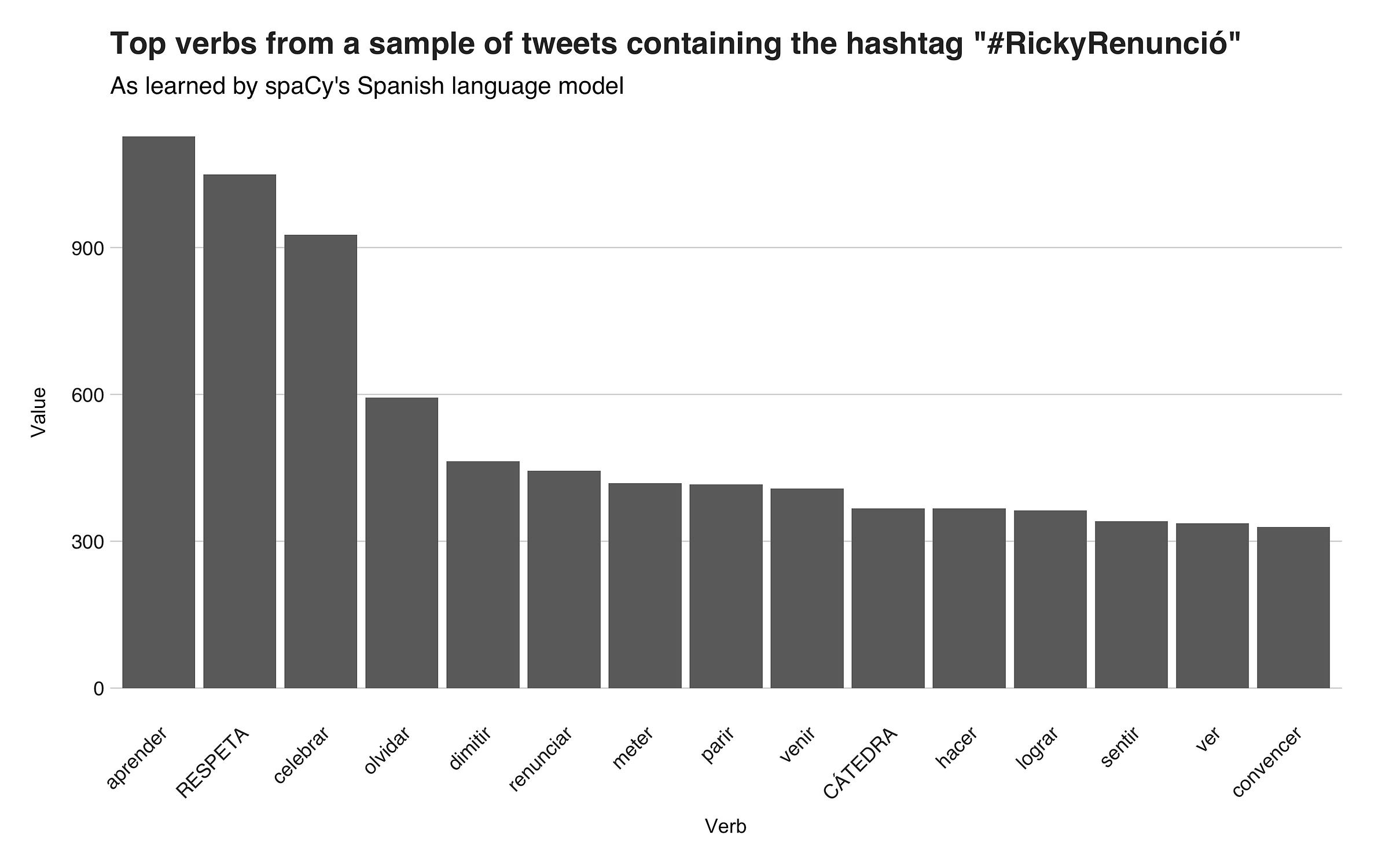 Top verbs.
Top verbs.
The first word from the list is “aprender,” which is Spanish for “learn.” This term appears mostly in a retweeted tweet that states that in the twelve days of protests, Puerto Rico has given a lesson to the world that everybody should learn. Likewise, the term shows up in tweets from people saying that their countries, e.g., Mexico, and Brazil, should learn from what happened in Puerto Rico. On the second position, there’s the capitalized word “RESPETA,” which means “respect,” and it comes from tweets saying that Puerto Rico and Latin America in general, deserve to be respected. (I left the capitalized words capitalized because I believe they have another sort of meaning when compared to the non-capitalized version). The third verb is the word “celebrar” (“celebrate”), which appears in a retweeted tweet aimed to Luis Fonsi (Puerto Rican singer; Despacito guy), telling him that he doesn’t deserve to celebrate because he didn’t show up or acknowledge the protests nor the movement. Then, there’s the word “dimitir” (resign), “renunciar” (also resign), “meter” (introduce), “parir” (give birth), “venir” (come), “CÁTEDRA” (slang for lesson), “hacer” (to do), “lograr” (achieve), “sentir” (feel), “ver” (see), and “convencer” (convince).
Regarding the sentiments, I found out that the average score was 0.12 from a scale -1 and 1, where -1 indicates a negative emotion, and 1 means a positive feeling), implying that most of them were slightly positive.
The following image shows the complete data.
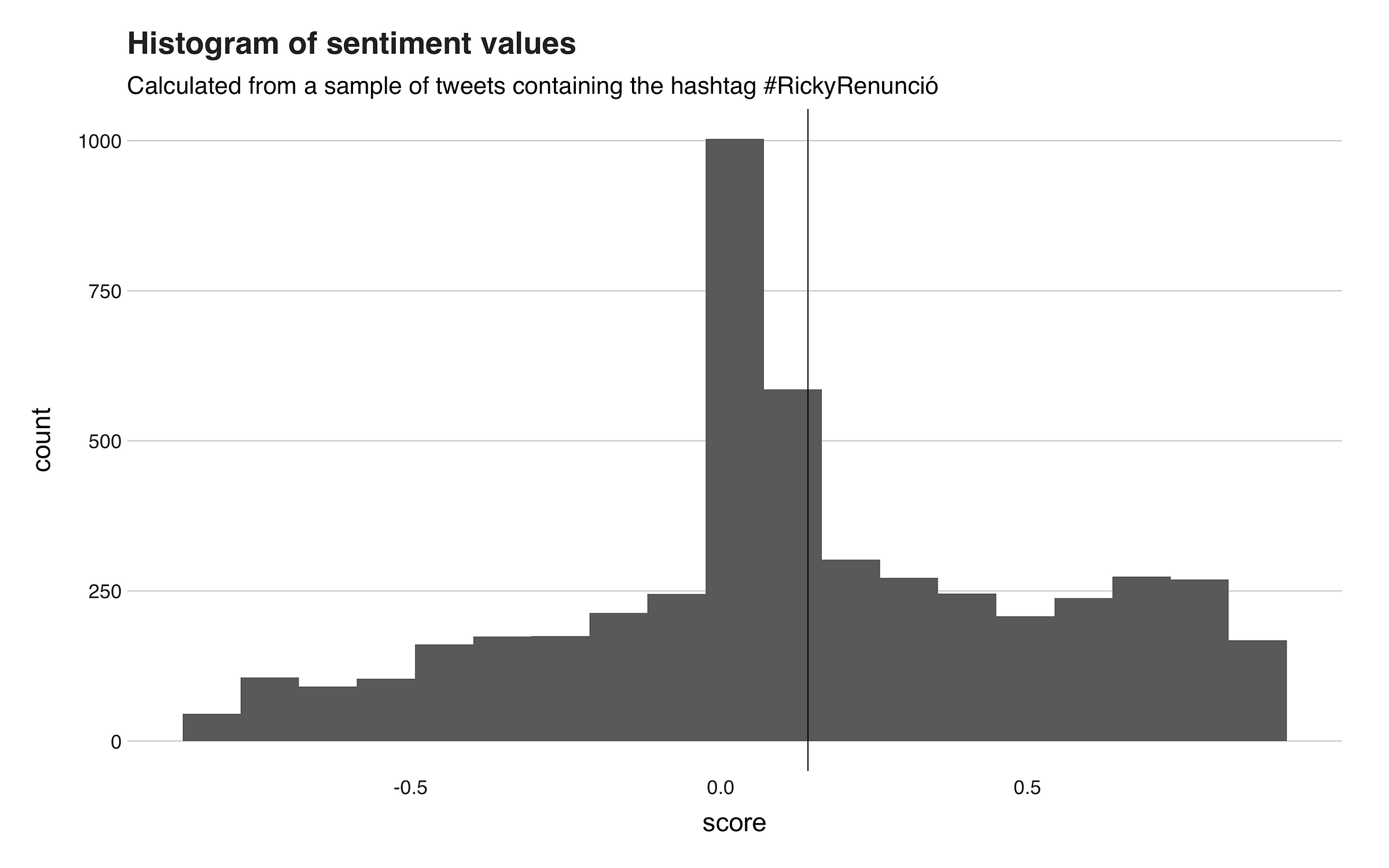 Top verbs.
Top verbs.
If you’re interested in the complete analysis, you can find it at the following link: What did Puerto Rico say after its governor resigned? A Twitter data analysis
Conclusion
In July 2019, thousands of Puerto Ricans gathered on the streets of Old San Juan to make themselves heard. But the protests didn’t end here. Puerto Rico and the rest of the world took over the social networks and gathered up under the banner of #RickyRenuncia and #RickyRenunció.
These two hashtags were more than mere words. They became real, tangible, and present. Through them, the people spread the messages, news, updates about the protests, feelings, and their solidarity.
In this article, I showed and recapped the role that social networks played in this revolution. By using aggregated data from Instagram, Twitter, and Google Trends, we discovered how popular and influential was the emergence of the hashtag #RickyRenuncia.
Thanks for reading.